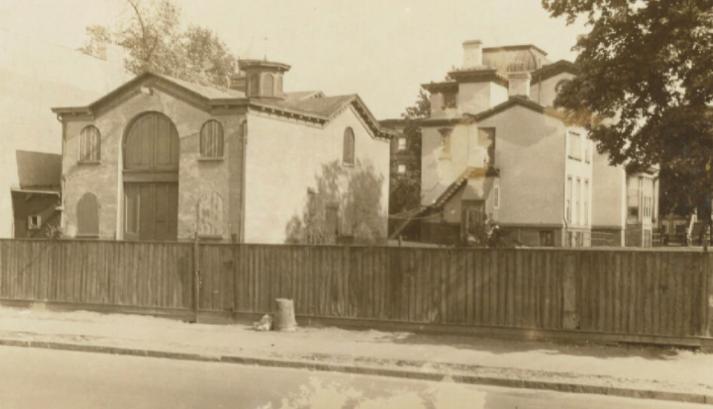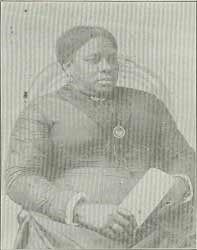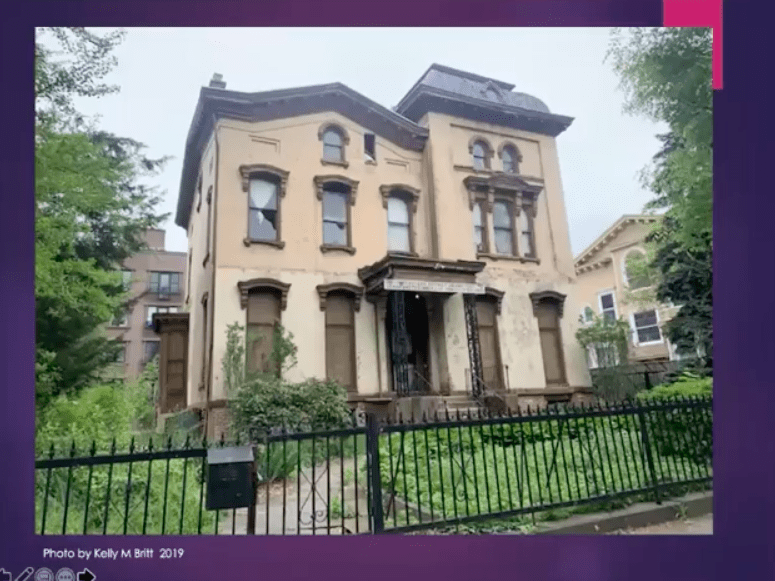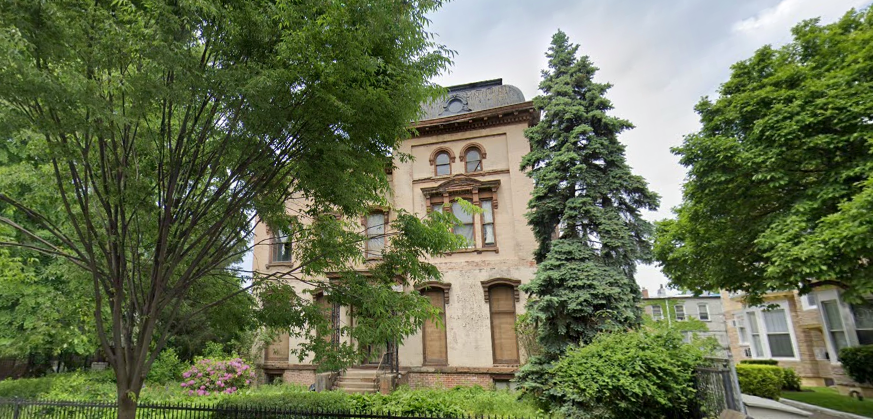A secret society that has worked quietly for more than 100 years to care for Black women and children is now pulling back the veil in the hopes its legacy can be protected for future generations.
In a recent event hosted by the Brooklyn Public Library, the United Order of the Tents Eastern District #3, based in Bed-Stuy, said it was ready for the neighborhood to know who they were and what they're about.
Previously, little was known about the Tents, a Black, Christian women's group that wears white and calls some members 'queens', and all members 'sisters'.
"For more than a century secrecy has served as our bond and protection, but it has also prevented the community from knowing about our great work," Tents Eastern District Executive Board President Essie Gregory said at the event.
"Today, we are in a struggle to save our home, as well as rebuild our organization in the eastern district. But it is our hope we will once again be a beacon of hope in the Bed-Stuy community."
Roots in the Underground Railroad
The United Order of Tents is one of the first Black women's benevolent societies in the country, originally founded in 1848 to provide aid to those escaping slavery via the Underground Railroad.
Its Eastern District headquarters is the once-opulent mansion at 87 MacDonough Street, which has hosted meetings, weddings, luncheons and been a center for mutual aid since the Tents bought it in 1945.
For more than 75 years, the Tents have been quietly fulfilling their mission to feed the hungry, tend to the sick, bury the dead, help raise children and care for the elderly.
However in recent decades, with membership and dues dropping, the society has struggled to find money to pay for the property's upkeep.
"We used to have hundreds of members, but many have died or gone into nursing homes or assisted living," Tents Eastern District #3 Superintendent Harriet Peterson said. "We've lost members and it's hard to get women to want to join."
Not for sale
Today, the villa's windows are boarded up, its paint is flaking and it could easily be mistaken as abandoned.
The Tents used to own land from MacDonough through Macon, but at one point sold it part of it to restore the villa to its former glory. A contractor was paid to do the work, but the Tents say workers destroyed their building instead.
"Most of the money [the Tents] got for the sale went to these people, and they just did demolition," longtime member and neighbor Dolores Lovelace said in a short film on the group's website. "They tore the place down, threw everything out... we felt so bad about it, they just destroyed the place."

Due to its location, the Tents say they have been repeatedly targeted by property developers, with people constantly ringing the doorbell, phoning and taking photographs outside the property.
Last year, an online scavenger hunt company even posted the Tents' property on Zillow as a clue, listing it for $9.75 million and causing a headache for its members.
The Tents have a message for all of those people: It's not for sale. Despite the outward appearances of their headquarters, the Tents want people to know that they are still there, and still doing the work they have always done.
"As we work to preserve our building and build our organization, we are determined this organization is not going to die, and this building will not be sold, because we owe it to our ancestors," Peterson said.
An important legacy in NY
The United Order of Tents was founded by Annetta M. Lane and Harriet R. Taylor, who were both formerly enslaved.

With the support of abolitionists J.R. Giddings and John Joliffe, the women ran a station on the Underground Railroad in Virginia providing aid to those escaping slavery. The operation was initially run out of tents, hence its name.
"Through their aid, many slaves were transported to free soil by the Underground Railroad. One station was located right here in Brooklyn at the old Bridge Street Church," Gregory said.
The mansion at 87 MacDonough Street is landmarked and undoubtedly historic, but it's been a slow process for the Tents to get funding to restore it.
Newly-elected Assemblymember for the 56th District Stefani Zinerman attended the event, and said she was committed to supporting the Tents in their restoration goal. She said the Tents' secrecy had been their success, but it had also made it harder to get funding as the story of its importance to the state had never been promoted.
"The reason they were so successful is they kept a tight circle, they didn't need accolades or proclamations," she said. "Their reward was they got to help generations of women."
However, she said she hoped the Tents' house would become part of the state's registry, the same way people visit Harriet Tubman's house in Auburn, they might visit the United Order of the Tents in Bed-Stuy.

Meanwhile Assistant Professor of Urban Archaeology at Brooklyn College Kelly M. Britt, who has been studying the history of the Brooklyn Tents with the society, said both the building and the Tents' legacy needed to be preserved.
"It's such an important place for Black women's history here in Brooklyn," she said.
"While historic preservation can preserve the physical structure... it's really not meaningful unless the non-material aspects are preserved. The power of preservation lies in the memories and legacy of the people and events that are embodied in a structure."
To learn more about the Tents and its preservation, or to apply to be a member, head to its website.




